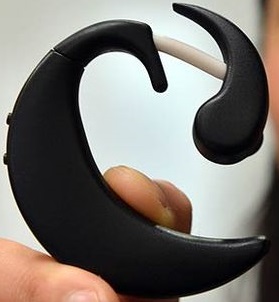Researchers in Japan are now testing a very small computer that can fit into the human ear.
As wearable technology explodes, particularly in the form of smartwatches, researchers in Japan are taking things a step further and are developing a tiny personal computer that a user can wear in his or her ear.
Users would control this device with a click of the tongue or a blink of the eye.
This wearable technology weighs only 17 grams and is completely wireless. It uses Bluetooth to connect with other devices and is equipped with a battery, speaker, microphone, compass, GPS, barometer, and gyro-sensor. Computing in the form of wearables is believed to be the latest thing in tech, but this latest development is easily among the smallest and most hands-free that has made its way to the headlines.
Other forms of wearable technology are notably larger, such as Google Glass, and Samsung Galaxy Gear 2.
This particular wearable technology for the ear is being called the “Earclip-type Wearable PC”, for the moment. It has microchip and data storage, which gives users the ability to load software. This, according to Kazuhiro Taniguchi, an engineer at the Hiroshima City University. The designs for the device are based on the traditional Japanese flower arrangements known as “ikebana”.
Taniguchi explained that the team of mobile developers created the device so that people would be able to think of wearing it in the same way that they would think about wearing earrings. The prototype for the gadget was demonstrated in black and had an overall comparable look to the sports style earbuds that wrap around the ear, or a single ear telephone headset.
The researchers are working to have this wearable technology ready by the holiday shopping season in 2015. At that time, users will be able to connect the device to their mobile devices such as an iPod or other gadgets that allow the user to navigate through various apps. All the user will need to do is change his or her facial expression, such as through a nose wiggle, a tongue movement, a raised brow, or even clenched teeth. Within the device inside the ear, infrared sensors detect the facial movements and respond accordingly.
SAP suggests that security and privacy are two of the most significant problems in the mobile sector
Software firm SAP sees security and privacy as two major issues when it comes to using big data in the mobile sector. Big data is a term that is used to identify the large amounts of unstructured data that businesses accumulate. This data is comprised of information regarding consumers and is typically collected by retailers without the express consent of customers. Security and privacy have become very controversial issues in recent years, partly due to the fact that people are becoming more reliant on mobile technology in their daily lives.
Survey shows that big data continues to be a high value resource for retailers
According to a recent survey conducted by SAP, many mobile industry groups believe that big data and retail go hand in hand. The survey shows that some 36% of industry groups believe that real-time offers coming from retailers engaged in the mobile commerce space will drive up the value of big data. This data is often used to design more effective marketing strategies and connect with consumers more aggressively.
Personal information is often collected from consumers without express consent
 The problem with big data, however, is that much of it is acquired without consent. Consumers often visit websites where they can shop online and in doing so they typically agree to have their information collected but are never made aware of such an agreement. This can quickly become a serious problem for retailers as consumers become more concerned over their own privacy and how their personal information is being used by businesses.
The problem with big data, however, is that much of it is acquired without consent. Consumers often visit websites where they can shop online and in doing so they typically agree to have their information collected but are never made aware of such an agreement. This can quickly become a serious problem for retailers as consumers become more concerned over their own privacy and how their personal information is being used by businesses.
Mobile operators and banks may offer ideal mobile payments support
The survey from SAP does not focus entirely on security and privacy, of course. The survey shows that many mobile industry groups have high hopes for mobile commerce in the future. Many of these groups believe that mobile network operators are ideally positioned to provide effective mobile payments platforms for consumers. Banks are also considered to be well situated to address many of the security issues that exist within the realm of mobile commerce due to the numerous regulations they must comply with.


 The problem with big data, however, is that much of it is acquired without consent. Consumers often visit websites where they can shop online and in doing so they typically agree to have their information collected but are never made aware of such an agreement. This can quickly become a serious problem for retailers as consumers become more concerned over their own privacy and how their personal information is being used by businesses.
The problem with big data, however, is that much of it is acquired without consent. Consumers often visit websites where they can shop online and in doing so they typically agree to have their information collected but are never made aware of such an agreement. This can quickly become a serious problem for retailers as consumers become more concerned over their own privacy and how their personal information is being used by businesses.